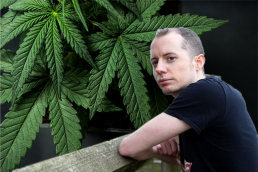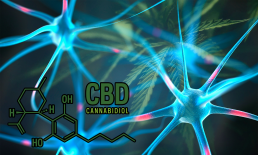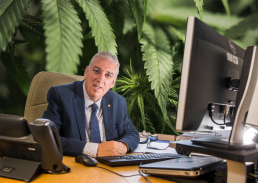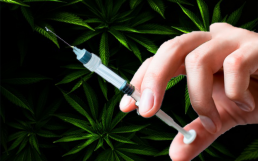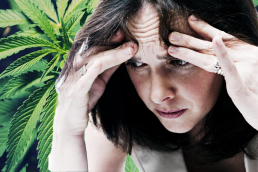Welsh cancer patient: “The Government is forcing me to break the law or die”
Welsh cancer patient: “The Government is forcing me to break the law or die”
- Welsh dad, Phil James, was diagnosed with brain cancer in 2015
- He initially vaped CBD Indica to treat the tumour, seeing initial success
- After tumour returned in Feb 2019, Phil began using cannabis oil containing THC
- The father of one is now “forced to break the law or die” due to the Government’s prohibition of cannabis
A Welsh cancer patient has spoken out after being forced to “break the law or die.”
Phil James, 33, from Flintshire, is using illegal cannabis oil to complement the chemotherapy he is undergoing to treat a brain tumour.
The father of one is using cannabis oil, containing the psychoactive cannabinoid THC, as he believes it can help extend his life.
“The oil is expensive and if you are buying from the criminal market you don’t know what is in it. So I thought I am going to grow it. If I grow it I will know exactly what’s in it.”
– Phil James, Medical Cannabis Warrior
Mr James began vaping “CBD Indica” after he was first diagnosed with a grade three Anaplastic Astrocytoma (brain tumour) at the end of 2015.
The CBD treatment was initially successful. Phil previously experienced seizures every 6-8 weeks, but found after vaping CBD they stopped entirely from March 2017 until around two weeks ago.
Six clear brain scans revealed the CBD treatment had also been successful at treating his cancer, showing only a minimal trace of the tumour.
Unfortunately, the tumour returned in February of this year, prompting the Welsh father to add an illegal cannabis oil, containing THC, to complement the chemotherapy treatment, as he feels this will give him the best chance of survival.
Speaking to North Wales Live, Phil explained his decision to add the illegal component of cannabis to his treatment program:
“Before this recurrence of the cancer I was vaping. When it came back I switched to the oil because I needed a higher dose.
“Chemotherapy kills daughter cells and cannabis attacks cancer stem cells.”
“The tragedy is that only a small amount of people have been prescribed because they were on private healthcare.
“It’s not being done on the NHS. If you are rich you can get the prescription but you can’t get the cannabis.”
Mr James argued that he should be able to legally grow his own medicine at home, due to the cost and individual biology of strains, adding:
“The oil is expensive and if you are buying from the criminal market you don’t know what is in it. So I thought I am going to grow it. If I grow it I will know exactly what’s in it.
“Hopefully taking a higher dose of the oil will insure me against seizures – which I think have come back partly because of the chemotherapy.
“The Government is forcing me to break the law or die.”
Despite the British Government legalising cannabis for medicinal use in November 2018, there have been widespread complaints from patients across the UK who have been unable to access it, either due to their GP’s inability to prescribe or the expensive price of private prescriptions.
Arfon Jones, Police and Crime Commissioner for North Wales, has been a long-time supporter of Phil’s cause, meeting the Welsh father several times while campaigning for wider access to medical cannabis.
Speaking to North Wales Live, Mr Jones said:
“My heart goes out to Phil James and the countless other people like him who are being criminalised needlessly.
“The legal position in relation to medicinal cannabis has been well and truly fudged as a matter of political expediency, to avoid a PR disaster caused by the heartrending cases of several children like the chronically ill Billy Caldwell, who needs cannabis oil to ward off life-threatening fits.
“It is unjust and cruel that people living with conditions like cancer and multiple sclerosis who use cannabis are putting themselves at risk of being prosecuted.
“There is a simple answer to this. Cannabis should be regulated and people should either be able to buy it over the counter through pharmacies and shops or be able to grow a limited amount for their own use.
“It goes without saying that cannabis oil to aid people like Phil James should be freely available so they can be helped in their time of need.”
Prohibition has failed to curb the use of cannabis in the UK, as it was the most commonly used drug in the 2017-18, with 7.2% of adults (16-59) having claimed to have used it in the last year, representing around 2.4 million people.
Punitive cannabis laws in the UK are also failing desperate patients like Phil, forcing them into a life of ‘crime.’
Follow Medical Marijuana UK on Facebook for more medical cannabis news!
Research indicates medical cannabis could hold the key to treating PTSD
Research indicates medical cannabis could hold the key to treating PTSD
- Multiple studies have found strong evidence that cannabis can help treat PTSD
- Cannabinoids reduce REM sleep, prevent nightmares
- Cannabinoids also prevent the retrieval of the underlying trauma
- PTSD diagnoses among UK military personnel rose by 2% in a decade
With more research into the medicinal properties of cannabis comes a greater understanding of which medical conditions may benefit from medical cannabis treatment.
Research is building a solid case that cannabis may hold the key to treating post-traumatic stress disorder (PTSD), a condition which develops following a traumatic event in a person’s life.
Those diagnosed with PTSD experience emotionally disturbing flash-backs of traumatic events, often in their dreams (nightmares). PTSD patients may also become emotionally numb, avoiding people and places which may trigger these flashbacks, isolating themselves from those who love them most.
Due to fears of nightmares, PTSD patients also have difficulty sleeping. Maintaining concentration is also difficult, and they are more easily susceptible to outbursts of anger or irritation.
Traditional PTSD medication can, unfortunately (as with most pharmaceutical medications), make some of these symptoms worse. Some of the common side-effects to PSTD medications include an increase in agitation, which could exacerbate the emotional instability of PTSD sufferers, and increase sleepiness, which is the last thing someone who experiences horrifying nightmares would want.
Medical cannabis, however, may have the potential to help treat some of the more serious symptoms of PTSD, without any of these troubling side-effects of the pharmaceutical medications.
The Endocannabinoid system (ECS) is central to research, as the ECS regulates essential mental functions, such as memory consolidation and retrieval.
Cannabinoids like THC and CBD activate cannabinoid receptors, known as CB1 and CB2, along the ECS, prompting the ECS to produce neurotransmitters that help promote happiness, pleasure, and regulate memory.
These cannabinoids may play an integral role in the future of PTSD treatments, as they prevent the retrieval of the underlying trauma, effectively blocking traumatic memories and nightmares, simultaneously aiding sufferers to achieve a more stable emotional state.
As cannabis helps bring out happiness while blocking trauma, it has made it a popular treatment for PTSD patients, many of whom are military veterans.
“…we know very well that people with PTSD who use marijuana — a potent cannabinoid — often experience more relief from their symptoms than they do from antidepressants and other psychiatric medications.“
– Dr. Alexander Neumeister
Researchers at NYU Langone Medical Centre found that those suffering PTSD exhibited much lower levels of anandamide, as well as other neurotransmitters.
Anandamide is one of the body’s primary endocannabinoids (a naturally produced cannabinoid in the body), responsible for core functions such as regulating happiness, fear, and anxiety.
Anandamides functions as a natural antidepressant, with the ability to impair memory as well.
CB1 cannabinoid receptors in the body help turn off traumatic memories, allowing us to essentially ignore them. Research also suggests that a lack of endocannabinoids, such as anandamides, may induce symptoms of PTSD such as fear and anxiety.
Lead author of the study, Dr. Alexander Neumeister, explained why more research must be conducted into the potential of using medical cannabis for conditions which pharmaceuticals are not well equipped to:
“There’s a consensus among clinicians that existing pharmaceutical treatments such as antidepressant simply do not work.
“In fact, we know very well that people with PTSD who use marijuana — a potent cannabinoid — often experience more relief from their symptoms than they do from antidepressants and other psychiatric medications.
“Clearly, there’s a very urgent need to develop novel evidence-based treatments for PTSD.”
PTSD triggers severe stress in its sufferers, putting them in a constantly tense state, often preventing them from getting to sleep. Even when those with PTSD are able to sleep, it is common for them to suffer intense nightmares.
Unlike antidepressants or other pharmaceutical medication prescribed to PTSD patients, cannabinoids can prevent, or at least minimise, nightmares.
Cannabinoids reduce REM sleep, which prevents the vivid dream which occurs during this state, suggesting medical cannabis has the potential to relieve PTSD sufferers from reliving their trauma via nightmares.
Canadian researchers conducted a study in 2009 to test this thesis by studying 47 PTSD patients who continued to experience nightmares despite the use of antidepressants and psychotherapy.
Following cannabinoid treatment (in the form of Nabilone, a synthetic medical cannabis medication), 72% of the patients either experiences a drastic reduction in the severity of their nightmares or stopped having them entirely. An improvement in the quality and duration of sleep was also reported.
The majority of the patients also had a reduction in daytime flashbacks.
The study highlighted how ineffective conventional, pharmaceutical medications are at treating PTSD, while making a really solid argument for the use of medical cannabis in future treatments.
Despite the growing number of evidence that medical cannabis has real potential to help treat some of the more serious symptoms of PTSD, it is not recognised by either the UK or US Governments.
Currently, only those suffering chronic physical pain or epilepsy have received medical cannabis prescriptions in the UK, and the Trump administration is continuing to oppose measures which would provide the medicine to those who need it most: US veterans.
The majority of PTSD patients served in our military, putting their lives and safety on the line for the country. The least we can do is provide them a safe and effective medication when they come home.
The overall rate of probable PTSD among current and ex-serving military personnel rose to 6% in 2014-16, compared with 4% in 2004-06.
Follow Medical Marijuana UK on Facebook for more medical cannabis news!
CBD and sleep: Research shows CBD can be used safely to treat insomnia and anxiety
CBD and sleep: Research shows CBD can be used safely to treat insomnia and anxiety
- 300,000 Brits are currently using CBD
- Anxiety and insomnia are two popular medical conditions CBD is used to treat
- American researchers have new evidence to support the use of CBD to treat both anxiety and insomnia
- 79.2% of patients with anxiety and 66.7% of patients with sleep issues experienced an improvement
Cannabidiol (CBD) is quickly becoming one of the most popular ‘herbal remedies’ on the British market.
An estimated 300,000 Brits are already using CBD to help treat a variety of medical conditions. Anxiety and insomnia are among the most popular conditions people are using the legal medical cannabis drug for, but does CBD really help treat these two conditions?
A new study, published in The Permanente Journal, has found strong evidence to support the claim that CBD can be used to help to treat both of these conditions.
Researchers from Colorado studied 103 adult patients with documented problems with anxiety and sleep quality, before choosing a final sample of 72 adults with primary concerns of anxiety (47) or poor sleep (25) for the investigation.
Nearly all the patients were provided with 25mg of CBD in capsule form. Patients displaying high anxiety were given doses every morning, after breakfast, while those struggling with sleep complaints were dosed every evening, after dinner.
A handful of patients were given larger doses of CBD (either 50/75mg a day or 75mg/d). One patient with a history of trauma and schizoaffective disorder was actually given a much larger dose of CBD, which was gradually increased to 175 mg/d (giving further credence to the argument that CBD can be used to treat psychosis).
The majority of the patients continued to take their pharmaceutical psychiatric medications alongside the CBD treatment. Patients treated with CBD were reviewed monthly by medical professionals.
By the second monthly follow-up, 41 patients (56.9%) remained on CBD treatment and completed assessments; 27 patients (37.5%) remained on CBD treatment at the third monthly assessment.
On average, anxiety and sleep improved for most patients, and these improvements were sustained over time.
At the first monthly assessment after the start of CBD treatment, 79.2% (57/72) of patients with anxiety and 66.7% (48/72) of patients with sleep issues experienced an improvement in anxiety and sleep.
However, 15.3% (11/72) and 25.0% (18/72) experienced worsening symptoms in anxiety and sleep, respectively.
Two months after the start of CBD treatment, 78.1% (32/41) and 56.1% (23/41) of patients reported improvement in anxiety and sleep, respectively, compared with the prior monthly visit.
Again, 19.5% (8/41) and 26.8% (11/41), respectively, reported worsening problems as compared with the prior month.
Overall, there was a greater decrease in anxiety scores than in sleep scores. The sleep scores demonstrated mild improvement. The anxiety scores decreased within the first month and then remained decreased during the study duration.
The study’s authors concluded that CBD “appears to be better tolerated than routine psychiatric medications,” although further randomised and controlled trials will be needed before definitive conclusions can be made.
Follow Medical Marijuana UK on Facebook for more medical cannabis news!
Cannabis strains high in CBD may ‘protect brain’ from THC, research shows
Cannabis strains high in CBD may ‘protect brain’ from THC, research shows
- New study from UCL show CBD may help protect brain from ‘harmful’ effects of THC
- Researchers believe CBD may be able to be used as a treatment for psychosis
- There is no conclusive evidence that THC causes psychosis; only correlations found so far
- Researchers want cannabis high in CBD more readily available, suggesting legalisation as the best way
One of the more common arguments against legalising cannabis is that its use may cause psychosis.
The science is far from being settled on this, with recent studies debating whether the link between cannabis and developing psychosis is a correlation rather than a causation, or highlighting that schizophrenics are using cannabis to help treat their condition, rather than fuel it.
There is also evidence to suggest that cannabis may induce users into psychotic episodes, especially amongst those already predisposed (although the study ponders wether other factors may contribute, such as early or heavy use of cigarettes or alcohol and poor school performance.)
A new study, published in the Journal of Pharmacology, may make the debate redundant.
Researchers at UCL found that cannabis strains higher in Cannabidiol (CBD) have a lower impact on the function of our brains, suggesting CBD may have a protective effect.
Researchers invited 17 people to participate in the study, splitting them into two control groups: one was provided with high THC, but negligible CBD strain (similar to street cannabis), while the other groups was given a strain with the same level of THC but a more equal level of CBD. They then monitored the brain activity at rest in the participants.
The study found that the low-CBD strain (street cannabis) impaired functional connectivity in the brain’s default mode (particularly in the posterior cingulate area) and salience networks, while the high-CBD strain caused only a minimal disruption to the these regions, suggesting that the CBD counteracts some of THC’s harmful effects.
The salience network supports other brain networks, determining what emotional or sensory inputs we pay attention to.
Disruptions to the network have previously been implicated in addiction and psychosis.
The researchers also found that the THC-induced disruption of functional connectivity in the posterior cingulate was strongly correlated with participants’ reports of subjective experiences, such as feeling more ‘stoned’ or ‘high’, suggesting that the brain area may be central to driving cannabis’ subjective effects.
This relationship between the posterior cingulate and subjective effects was also blocked by CBD, suggesting CBD may be able to block users feeling ‘stoned.’
“As cannabis is becoming legal in more parts of the world, people buying cannabis should be able to make an informed decision about their choice of cannabis strain and be aware of the relative risks.”
– Dr Matt Wall, study lead author, (UCL Clinical Psychopharmacology Unit and Invicro)
Discussing the results of the study, Dr Matt Wall, the study’s lead author, explained how the research suggests that the best way to prevent people developing psychosis, and other mental illness attributed to cannabis, is to legalise it:
“Over the last two decades, rates of addiction and psychosis linked to cannabis have been on the rise, while at the same time stronger strains of cannabis with more THC and less CBD have become increasingly common.
“We have now found that CBD appears to buffer the user against some of the acute effects of THC on the brain.
“As cannabis is becoming legal in more parts of the world, people buying cannabis should be able to make an informed decision about their choice of cannabis strain and be aware of the relative risks.”
Professor Val Curran, co-author of the study, added that the research may lead to further studies on the potential of using CBD as a treatment for psychosis:
“If CBD can restore disruption to the salience network, this could be a neuroprotective mechanism to explain its potential to treat disorders of salience such as psychosis and addiction.”
The debate whether cannabis causes psychosis is now nearly irrelevant.
If cannabis is causing psychosis, it is because of its high THC, low CBD content: this phenomenon only exists due to prohibition.
When you criminalise a substance, you simply do not prevent use. In fact, research shows that drug use has risen exponentially since prohibition.
Restricting access to drugs leads to a higher potency of said drugs, just look at the prohibition of alcohol in the USA: not only did bootleggers start to produce extremely strong moonshine, but it also led to the rise in organised crime, specifically the mafia.
Those who are genuinely concerned about preventing vulnerable people from developing psychosis from cannabis, therefore, must logically support legalisation.
With legalisation comes a greater variety of strains of cannabis. No longer will consumers be at the mercy of the black market. The strains available on the black market are nearly exclusively high THC, low CBD.
Giving people a choice, between high CBD and high THC cannabis, may curb the potentially harmful effect THC is having on users’ brains. Legalise cannabis: it’s a no brainer.
If you don’t want to wait for the Government’s permission to use a non-toxic medication, then grow your own!
Medical Marijuana Genetics are the world’s leaders in producing strains high in CBD.
For more medical cannabis news, follow us on Social Media.
The science behind why cannabis oil helps treat seizures
The science behind why cannabis oil helps treat seizures
- CBD has become world famous for its anti-seizure properties
- Children suffering life-threatening epilepsy have seen amazing results since starting CBD treatment
- Here we explain some of the basic science behind this beautiful process
There’s has been a huge increase in the interest into medical cannabis over the past year. The nation’s media has become infatuated with inspirational stories of epileptic children winning their fight with the help of the ancient medicinal herb.
Children like Alfie Dingle, Jorja Emerson and Murray Gray have become national heroes, helping illuminate the wonderful potential medical cannabis has for helping these severely epileptic children live a more normal life, free from life-threatening seizures.
Cannabidiol (CBD), the non-psychoactive cannabinoid, has been placed firmly in the spotlight, due to it being non-toxic and its excellent anticonvulsant properties.
CBD has become popular within the mainstream due in part to its legal nature: anyone can legally purchase CBD over the counter in the UK.
The main reason for the rise in CBD’s popularity, then, is because, simply put: it works.
But how exactly does CBD help treat seizures?
To understand how CBD works within the human body, we must first understand what the Endocannabinoid System (ECS) is and how it works.
The ECS works like a secondary nervous system, with cannabinoid receptors located in both the body and brain. The receptors work like a key hole, with cannabinoids acting like keys. We know these receptors as CB receptors; CB1 receptors are primarily located in the brain (neurones), while CB2 receptors are primarily located throughout the body (the immune system).
There are more receptors involved in the ECS, but CB receptors seem to have the most relevance for treating seizures.
Both CB1 and CB2 receptors are widely distributed along the central nervous system, belonging to a class of G-coupled receptors. The discovery of cannabinoid receptors on the nervous system began a search for naturally occurring cannabinoids (endogenous) cannabinoids. These were found to be anandamideand 2-AG.
A number of clinical studies have suggested that endocannabinoid signalling is involved in epileptic seizures.
For example, patients with new-onset temporal lobe epilepsy have been observed to have reduced anandamide concentrations in their cerebrospinal fluid and downregulation of CB1 receptor. This suggests that a problem within the endocannabinoid system is contributing to seizures and thus cannabinoid therapy is likely to correct it.
An Israeli study, investigating the ECS and autism, also found a connection between children with Autism spectrum disorder (ASD) have lower levels of endocannabinoids than children not on the spectrum.
Cannabinoids have been shown to have a variety of complex pharmacological properties.
While THC is not as well known as CBD for its anti-seizure properties, they are studies which have found the psychoactive cannabinoid to have them. Researchers believe this is due to the activation of the CB1 receptor, which is also causes the psychoactive effects associate with THC.
Conversely, CBD has a much weaker affinity with CB1 and CB2 receptors. Its anti-seizure properties is believed to be activated in other areas of the body. Some researchers believe that CBD is interacting with multiple transmembrane receptors, ion channels and neurotransmitter transporters. In particular, CBD has been observed to activate the G-protein coupled receptor 55(GPR55) and this appears to play an important role in CBD anti-seizure activity.
CBD has had tremendous success in the treatment Dravet syndrome and Lennox-Gestaut syndrome. In both cases, there was a significant drop in the frequency of the convulsive seizures, determined by the well-controlled clinical trials. It is important to mention that the results were achieved in the combination with the already FDA approved treatment drug, clobazam.
While legal CBD is sweeping the nation, with those suffering from myriad medical conditions, from those diagnosed with epilepsy to those suffering arthritis, flocking to shops to buy CBD over the counter, we must remember that there are other cannabinoids, and that they work far better together.
Isolating cannabinoids is fine, but can never replace whole plant extract.
Cannabis works best as it is intended: as one. When cannabis oil contains all the chemical compounds present in the cannabis plant, it produces something known as the “entourage effect.”
For now though, it is beautiful to see so many wonderful families given a second lease of life due to the immense impact CBD is having for their children.
Follow us on Social Media for more medical cannabis news.
Welsh police boss, Arfon Jones, calls for regulation of cannabis and home growing to stop drug gangs
Welsh police boss, Arfon Jones, calls for regulation of cannabis and home growing to stop drug gangs
- Afron Jones, PCC for North Wales, has called for the regulation of cannabis to stop rise in criminal gangs
- The police chief also called for people to start growing cannabis at home
- “They’re not harming anybody else and there is no reason why they should be punished through the criminal justice system.”
Arfon Jones, Police and Crime Commissioner (PCC) for North Wales, has called for the British Government to regulate cannabis to help prevent the rise in criminal gangs, even calling for people to be allowed to grow the drug at home for personal use.
Mr Jones, who is well known within the cannabis community as a pragmatic leader who bases policy off scientific evidence, believes that a new licensing system, similar to one seen in Canada and Uruguay, should be introduced so cannabis can be sold over the counter.
The PCC for North Wales has long opposed prohibition, favouring reforms to UK drug laws, as he believes they have the opposite effect to their intention.
Discussing his proposal to regulate cannabis to the Denbighshire Free Press, Mr Jones explained why he believes regulation is a better policy for reducing crime and drug users than a blanket ban of drugs:
“It is a nonsense to criminalise people who take cannabis for recreational use and cause no harm to anybody else.
“The best way to reduce the role of organised crime in the supply of drugs is to put it in commercial hands and to price it appropriately so people don’t need to go to the illegal market.
“Commercial organisations have taken over the medicinal cannabis market and are selling prescriptions at a vast cost even though it is cheap to grow. That’s just exploitation in my book.
“My view is that people should be allowed to grow a limited number of cannabis plants for their own use.
“Let’s face it there are probably hundreds of thousands of people in this country who grow cannabis in their own homes now.
“They’re not harming anybody else and there is no reason why they should be punished through the criminal justice system.
“It would be sensible to follow the example of Spanish cannabis clubs where people are allowed to grow seven or eight cannabis plants in the club.
“If you were starting from scratch I think cannabis would be more lightly regulated than alcohol is now because I think everybody agrees that alcohol is far more harmful to individuals than cannabis is.
“Just like alcohol, you should have age restrictions on the purchase and consumption of cannabis is a regulated market.
“That age limit could be 18 or 21. If you’re in the USA you can’t consume alcohol until you’re 21 but I am not hung up on the issue of age. I would respect the advice of experts on this matter.
“What I am clear about is that chasing and prosecuting recreational users of cannabis should not be a police priority when they are causing absolutely no harm to anybody else.“
– Arfon Jones, PCC for North Wales
“What I am clear about is that chasing and prosecuting recreational users of cannabis should not be a police priority when they are causing absolutely no harm to anybody else.
“Rather than overload an already creaking criminal justice system, we need a more enlightened and more effective approach.
“In the autumn I will be launching a new scheme called Checkpoint in North Wales – after it was developed by Cambridge University and successfully trialled in Durham – which is designed to divert low level offenders away from criminality.
“We need to recognise that 90 per cent of drug consumption including cannabis is recreational use and non-problematic.
“In those cases, people should be given some educational information and that would be the end of the matter.
“Meanwhile, the legal position in relation to medicinal cannabis has been well and truly fudged as a matter of political expediency to avoid a PR disaster caused by the heart-rending cases of several children like the chronically ill Billy Caldwell who needs cannabis oil to ward off life-threatening fits.
“It is also unjust and cruel that people living with conditions like multiple sclerosis who use cannabis are putting themselves at risk of being prosecuted.
“At a time when North Wales Police has had to contend with £30 million in austerity cuts since 2010, we need to be focusing instead on the supply of illegal substances because of the violence associated with it, the problems it causes and the exploitation of young people and vulnerable people.
“It is unfair that a conviction for minor cannabis possession can blight a person’s future career.
“That’s what happens when people go through the criminal justice system. so we need to look at a different way and we are doing that here in North Wales.
“I recently visited Montevideo which is one of the most prosperous capital cities in Latin America, so clearly when they regulated cannabis back in 2014 the sky didn’t fall in. It’s a lesson we should learn here.”
Britain needs more leaders like Arfon Jones. His vision for basing policy off scientific evidence is a growing one, shared by other leading PCCs in the UK.
Ron Hogg, PCC for Durham, was one of the first Commissioners to call for a more relaxed approach to policing cannabis, telling his officers in 2015 to only pursue arresting large commercial grows run by criminal gangs, rather than targeting vulnerable medicinal users.
Pursuing a policy which criminalises cannabis users is clearly not working. If the intention of the policy was to reduce the number of users, it has failed: cannabis is the most popular drug in the UK, with 7.2% of adults aged 16 to 59 having used it in the last year (around 2.4 million people).
This is the highest rise in use in 9 years. Cannabis was reclassified as a class B drug in 2008 (11 years ago).
For those truly opposed to a rise in the use of cannabis, a more sensible, compassionate approach, like the one Arfon is advocating, is clearly needed. Banning a substance clearly does not reduce use: it increases it.
Research suggests regular cannabis users may need more anaesthesia for surgery
Research suggests regular cannabis users may need more anaesthesia for surgery
- Cannabis users may need double the anaesthetic non-cannabis users do
- Researchers in Colorado studied 250 patients needing colonoscopies
- 10% were cannabis users
- Those 10% needed more than double anaesthetic the non-cannabis users did
A new study from the US has found evidence that regular cannabis users may need more than twice the usual dose of anaesthesia for surgery.
Due to an increase in the number of states which have legalised medicinal or recreational, researchers in Colorado conducted a study to gain a better understanding of whether cannabis can impact the effectiveness of anaesthesia.
In the relatively small study, researchers studied 250 patients who underwent ‘minimally invasive procedures’ requiring anaesthesia.
Twenty-five patents, 10% of the study group, were regular users of cannabis.
Researchers found that these 25 patients required more than twice as much anaesthetic propofol than their non-cannabis user counterparts, 14% more analgesic fentanyl and 20% more of the sedative midazolam.
Discussing the results of the research in an email, lead study author, Dr. Mark Twardowski of Western Medical Associates in Grand Junction, Colorado, said:
“Cannabis users cannot assume that their use will have no effects on their medical care.
“Clearly, the fact that use affects the effectiveness of these three medications certainly raises myriad questions about potential effects on other medications (pain medicines, anxiety medicines, etc.)
“Because cannabis has such a long life in the body, it may take months to ameliorate the effect.
“Patients absolutely need to inform their [health care] providers about cannabis use prior to any procedure.”
“Patients absolutely need to inform their [health care] providers about cannabis use prior to any procedure.”
– Dr. Mark Twardowski of Western Medical Associates in Grand Junction, Colorado
While the results of the study may be of some concern to cannabis users, the study has limitations, needing more research before any definitive conclusions can be made.
One such limitation noted by researches is that cannabis users may have withheld information about their use during the study, due to a residual negative stigma attached to cannabis use.
Expanding on Dr. Twardowski’s concerns, Dr. Winfried Hauser explained that cannabis users’ need for more anaesthesia is only problematic if patients withhold information about their cannabis use:
“There is only a problem if patients do not tell their doctors that they are consuming cannabis, and if doctors do not know the consequences of cannabis use for anaesthesia.
“Most probably, the number of patients which require increased dosages of anaesthetics because or recreational and/or medical use of cannabis will increase due to legalisation of medicinal or recreational cannabis.”
Follow us on Social Media for more medical cannabis news.
Research finds cancer patients report “significant reduction” in severity of symptoms
Research finds cancer patients report “significant reduction” in severity of symptoms
- New research finds more evidence cannabis can help treat symptoms relating to cancer
- 1,120 cancer patients in Minnesota were studied over a four-month period
- 50% of patients reported at least a 30% decrease in vomiting after four months
Researchers at Minnesota’s medical cannabis programme have reported that cannabis treatments are helping cancer patients cope with a range of symptoms related to cancer and chemotherapy, from depression to pain.
Results from the two-year study, involving 1,120 caner patients enrolled in Minnesota’s medical cannabis program, were announced on Monday, 8 April.
Participants in the study were surveyed for the severity of eight symptoms they were experiencing before purchasing medical cannabis, providing baseline scores on each of the eight symptoms, which were statistically compared with the average symptom scores reported in the first 4 months of program participation.
The eight symptoms studied were: anxiety, appetite (lack of), depression, disturbed sleep, fatigue, nausea, pain, and vomiting.
Researchers found that patients using medical cannabis reported a “significant reduction” in the severity of symptoms during the first four months of treatment.
One of the symptoms which saw the largest decrease in severity was vomiting. Half of the surveyed patients (50%) self-reported at least a 30% decrease in vomiting after four months, with nearly a third (27%) reporting a 30% decrease in fatigue.
The results also offer more evidence that cannabis should be offered as a first option, as only 10% of patients reported experiencing side-effects. All of these side-effects are non-fatal, such as dry-mouth, increased appetite, and tiredness.
From the results of the study, it is clear that if we want to help our cancer patients live the most comfortable life they can while going through treatment, we need to offer them medical cannabis treatment. Not as an ‘once all has failed’ treatment, but the very first thing they are offered.
Despite cannabis being legalised for medicinal use in Britain last November, cancer is not currently a qualifying condition for the drug.
In a deluded attempt to try and keep desperate cancer patients from using medical cannabis, they are being denied legal access.
This is not having the desired effect: cancer patients are not giving up on their hope to use medical cannabis to ease their suffering, they are merely either illegally growing it themselves, or worse, being forced to participate and grow the black market run by dangerous criminals.
Outdated prohibition laws have not ended the “War on Drugs.” Is it time the British Government fully legalises all forms of cannabis?
Follow us on Social Media for more medical cannabis news.
Australia launches world’s first clinical trial investigating medical cannabis as a treatment for Tourette’s
Australia launches world’s first clinical trial investigating medical cannabis as a treatment for Tourette’s
- Researchers at the University of Sydney have launched a clinical trial investigating cannabis as a treatment for Tourette’s
- The study will examine whether THC and CBD can help reduce the frequency and severity of tics for Tourette’s sufferers
- Cannabis will be supplied by the Lambert Initiative
- Up to 106,000 people between 5 – 18 may have Tourette’s syndrome in the UK
Currently, there is no known cure for Tourette syndrome, but researchers in Australia are hoping to find success with medical cannabis.
Traditional treatment seeks to help Tourette’s patients control their tics that inhibit everyday functioning, but not with side-effects, including weight gain, sleepiness, and depression.
Researchers are hoping that cannabis may offer a safe alternative to Tourette’s treatments, much like epilepsy patients who now have medical cannabis treatments which do not run the risk of leaving them brain-damaged as the pharmaceutical medications could do.
Australian scientists at Wesley Medical Research are launching the pioneering clinical trial, using cannabis supplied by the Lambert Initiative for Cannabinoid Therapeutics at the University of Sydney, to investigate the potential efficacy of medicinal cannabis as a treatment for Tourette’s syndrome.
For the investigation, researchers will provide participants either with medical cannabis or a placebo, monitoring them over two treatment periods. Whether the participants are given the placebo or cannabis will remain unknown to both the researchers and subjects until the trial is completed.
The study will examine the viability, and more importantly, the safety, of using cannabinoids to reduce tic frequency as well as the psychiatric and cognitive symptoms associated with Tourette syndrome.
“The purpose of this clinical trial is to investigate whether medicinal cannabis is a potential therapy for people with Tourette syndrome,“ said Dr. Philip Mosley, Chief Investigator and neuropsychiatrist at Wesley Medical Research, explaining how important scientific research is for the future of medical cannabis:
“Given the public interest in the therapeutic use of cannabis, it’s important to conduct rigorous and methodologically-sound research.”
Discussing the first-of-its-kind trial, Professor Iain McGregor, Academic of the Lambert Initiative, explained why the group decided to investigate cannabinoid treatment for Tourette’s:
“There is already early evidence to support the successful treatment of Tourette syndrome with cannabinoids.
”This clinical trial could have a major impact and greatly improve the lives of those living with Tourette syndrome.”
One of the people McGregor is trying to help is Chris Wright, 31, who has lived with Tourette’s since childhood.
Despite being prescribed pharmaceutical medication, Chris’s condition has continued to have control over his life.
Now, Chris hopes this revolutionary trial could change his life for the better:
“Any reprieve would be very welcome.

“It is getting to the point where I don’t know what to do, it feels as though it all gets too much sometimes.
“Tourette syndrome has really been a blow to my confidence […] my life in general, I often spend my days off sleeping and recovering just to do it all again.”
“Our focus is to give people like Chris these opportunities to improve their quality of life.“
– Dr. Jennifer Schafer, Senior Clinical Trials Manager at Wesley Medical Research
Dr. Jennifer Schafer, Senior Clinical Trials Manager, explained how a desire to potentially alleviate people like Chris’s suffering was a primary focus for launching the trial:
“Our focus is to give people like Chris these opportunities to improve their quality of life.
“We offer hope and answers through medical research.
“We are fortunate to have dedicated frontline clinicians like Dr. Mosley leading this important work and donors who continue to support this valuable work.”
So far, there is only limited, anecdotal, evidence that cannabis may offer relief to Tourette’s sufferers.
Clinical research is essential for progressing the availability of medical cannabis.
Despite cannabis being legalised in the UK for medicinal use in November 2018, patients are finding it impossible to get a prescription (especially on the NHS).
Only a handful of “expert” clinicians are able to prescribe medical cannabis in the UK. Only a handful to deal with millions of patients whose lives could be radically improved by medical cannabis.
The more research that is conducted, finding more and more evidence of the viability and safety of cannabinoid therapy on a plethora of medical conditions, the harder it will be for Governments to deny access to their citizens.
Follow us on Facebook for more medical cannabis news.
References and further Reading
Study finds nearly half of patients are replacing anxiety medications with medical cannabis
Study finds nearly half of patients are replacing anxiety medications with medical cannabis
- Canadian researchers have found evidence cannabis can replace pharmaceutical medication for anxiety and depression
- 44.5% of participants were able to completely replace benzodiazepines with medical cannabis
- Those who did not take any Benzos at the end of the study saw a nearly 40% reduction in the overall impact their mental illness had on their life
- Researchers believe they saw these results because cannabinoids regulate serotonin
- In 2013, there were 8.2 million cases of anxiety in the UK
A new study has found that half of participants were able to replace their anxiety medication with medical cannabis.
Canadian researchers launched an observational study “to investigate the reduction of benzodiazepine use in patients using prescribed medical cannabis,” finding compelling evidence that cannabinoids may have the potential to safely treat symptoms of anxiety in patients.
For the study, 146 medical cannabis patients who reported benzodiazepine use at initiation of cannabis therapy were monitored over a six-month period, with physicians collecting self-reported patient information at each clinic visit.
According to the study, nearly half of the patients who participated in the study were able to replace their benzodiazepine prescription with medical cannabis.
After completing an average 2-month prescription course of medical cannabis, 30.1% of patients had discontinued benzodiazepines.
At a follow-up after two prescriptions, 65 total patients (44.5%) had discontinued benzodiazepines.
At the final follow-up period after three medical cannabis prescription courses, 66 total patients (45.2%) had discontinued benzodiazepine use, showing a stable cessation rate over an average of 6 months.
Researchers also noted that patients who were able to completely replace their benzodiazepine intake with cannabis saw an increase in their quality of life.
Asked “How often is your life affected/impacted by your medical condition” at the beginning of the study, 74% of participants replied “All the time.”
After three visits to the clinic, those who had completely replaced benzodiazepine with medical cannabis reported that their medical condition affected them “all the time” only 30.3%, compared with 45% for those who were using benzodiazepine as well as medical cannabis.
The study’s authors believe the reason they saw a reduction in benzodiazepine-use in patients using cannabis due to potential cannabis has at increasing serotonin levels.
Research already exists that shows the Endocannabinoid System (ECS) regulates serotonin production, suggesting that cannabinoid-therapy could be used to treat depression and anxiety (primary reasons patients are prescribed benzodiazepine).
For example, scientists found in a 2007 study that 20% of mouse serotonin neurons had cannabinoid receptors. A 2004 study, found that when given THC, serotonin levels increased in lab mice. When they blocked CB1 receptors in mice, serotonin levels decreased.
“By offering a safer alternative like cannabis, we can keep people away from addictive substances.“
– Dr. Michael Verbora, Chief Medical Officer of Aleafia Health
Discussing the results of the study, Dr. Michael Verbora, Chief Medical Officer of Aleafia Health (where the study was conducted), explained why this research has important implications for the future of how we treat mental illnesses:
“A lot of the medications we use to treat depression work by changing the amount of serotonin that’s available for the brain to utilize.
“Cannabinoids may increase serotonin levels in certain conditions and reduce them in others.
“The opioid crisis gets a lot of air time, but people don’t always realise that behind the [opioid] crisis is benzodiazepine addiction and overuse of antidepressants.
“By offering a safer alternative like cannabis, we can keep people away from addictive substances.
“What was interesting to me was that over 80 percent of the patients in the study specifically said that when it came to depression and anxiety, they reported a marked improvement in both.”
Mental illness is on the rise in the UK, with 7.8% of people meeting criteria for diagnosis meeting for anxiety and depression, making it them the most common mental illnesses in Britain.
In 2013, there were 8.2 million cases of anxiety in the UK, meaning 8.2 million people could potentially benefit from cannabinoid therapy.
However, while the results of the study are a positive indication about the potential of medical cannabis, the authors remain cautious of over-stating the efficacy of medical cannabis, conceding that more research is needed before definitive conclusions can be made.
Follow us on Facebook for more medical cannabis news.

